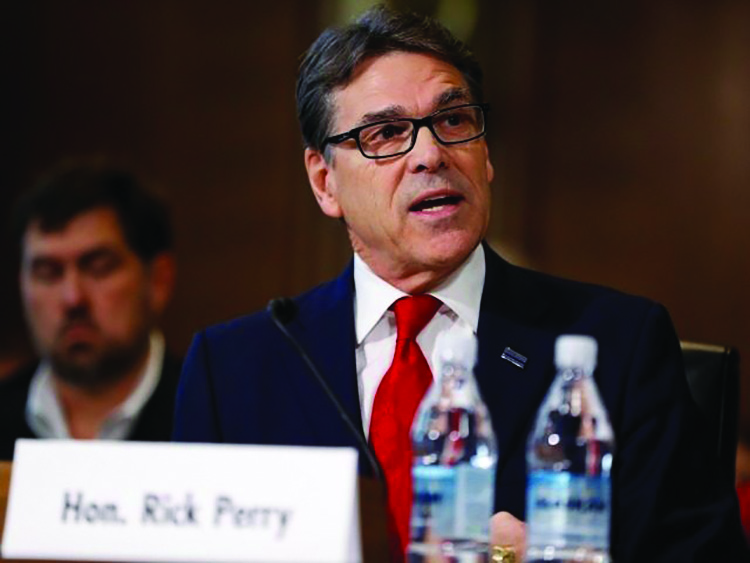Rick Perry said he would work with states interested in renewable energy. What does this mean to Wisconsinites?
Trump’s pick to head the Energy Department has a murky stance on climate change
More stories from Andee Erickson
Photo by Submitted
Rick Perry, former Texas governor and President Donald Trump’s pick to head the Energy Department sat before the Senate Committee on Energy and Natural Resources last Thursday.
President Donald Trump’s nominee to head the U.S. Department of Energy, former Texas governor Rick Perry told senators in his hearing last Thursday he would work with states to lay the groundwork for renewable energy, but avoided giving a straight answer to a question on whether or not he believes climate change is a global crisis demanding a dramatic shift away from fossil fuels
“I believe the climate is changing. I believe some of it is naturally occurring. I believe some of it is caused by manmade activity. The question is how do we address it in a thoughtful way that doesn’t compromise economic growth,” Perry said to the Senate Committee on Ehttp://www.cbsnews.com/news/rick-perry-suggests-global-warming-is-a-hoax/nergy and Natural Resources in response to Sen. Bernie Sanders (I-Vt.) pointing out a 2011 news report stating Perry didn’t believe in global warming.
The committee has not yet voted to confirm Perry’s nomination to run the Energy Department, an agency responsible for advancing the nation’s energy, environmental and nuclear security while also supporting scientific and technological innovation, according to a cabinet memo. The department also oversees 17 National Laboratories that contribute significant research to the U.S.
Despite past denial of climate change and campaigning for president in 2012 on a platform to abolish the Energy Department (an idea he said in Thursday’s hearing he now regrets), Perry led the state of Texas to the country’s number one wind producer. In 2005 Perry signed a law requiring that the state increase its dependency on renewable energy by 5,880 megawatts come 2015.
Sen. Mazie Hirono (D-Hi.) asked Perry if he would support a national renewable energy standard and Perry’s response echoed the words of other Republican nominees insofar as he said he doesn’t support a “one size fits all” model, but a state-by-state approach.
“I will talk to any governor about the wisdom of using their universities, using their private sector, using the Department of Energy where it fits to come up with the technologies that moves forward their state’s position from the standpoint of renewables where it fits in …,” Perry said. “I’ll be happy to give them the roadmap on how to do that.”
What is unclear is if Wisconsin’s government would engage in such an effort.
Wisconsin is one of 29 states with a renewable standard portfolio (RSP), which requires utilities and other energy providers to generate a certain amount of its energy using renewable sources.
The state met its 2015 RSP goal of reaching 10 percent in renewable energy, but Katie Prutz, communication and operations associate of RENEW Wisconsin, said there doesn’t seem to be any state effort to expand that base since it has been met. Nor does she anticipate the state would participate in any planning with the Energy Department to further its use of renewable energy.
“We don’t expect it, however our neighboring states are expanding,” Prutz said. “Michigan, for example, just expanded their renewable standard portfolio to 15 percent and they have a Republican governor and a Republican legislature so we would certainly be willing to work with our allies and anyone in government to get [renewable energy] expanded, but we do not expect that will be something that’s expanded.”
It’s also unclear how much weight was behind Perry’s statement when he suggested he would be willing to work with states to lay the ground for more renewable energy. Assistant watershed institute professor David Soll said Perry’s statement seems empty.
Soll grew up in the state Perry would later govern for almost 15 years and said the rise in wind solar development should also be credited to the plain landscapes and scarce populations of the state.
“Sometimes government leads and sometimes government follows,” he said, and this might have been an instance where Texas didn’t lead a fight against non-renewable energy, but rather followed an economic trend that also happens to favor the environment. Economic and environmental benefits can work hand-in-hand, Soll said, an idea many environmentalists like to debunk.
With the cost of solar energy dropping and the challenging market conditions for coal, the economy is evolving to favor renewable energy over fossil fuels, Soll said, but that doesn’t mean he isn’t worried about the effects of climate change.
“We need to replace so much of our fossil fuels with renewable energy,” he said, “but we’re not going to get there fast enough in the absence of government policy.”

